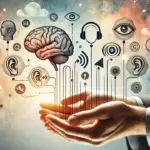Introduction
In our fast-paced world, emotional intelligence (EI) has become a crucial skill for fostering effective communication and building strong relationships. Whether you’re a coach, teacher, or professional in any field, understanding and managing emotions plays a pivotal role in your success and the well-being of those around you. This is where Neuro-Linguistic Programming (NLP) emerges as a transformative tool.
For those new to the concept, NLP is a psychological approach that involves analyzing strategies used by successful individuals and applying them to reach a personal goal. It relates thoughts, language, and patterns of behavior learned through experience to specific outcomes. Specifically, NLP techniques for emotional intelligence are invaluable for anyone looking to enhance their empathy and understanding – key components of EI. By mastering these techniques, you can learn how to read and respond to others’ emotions more effectively, a skill especially beneficial for coaches venturing into the realm of digital marketing.
As we delve into the world of NLP and its impact on emotional intelligence, remember that this journey is about enhancing your ability to connect with, understand, and influence others positively. Whether you’re just starting out or looking to refine your skills, this guide will provide you with practical insights and strategies to take your EI to the next level.
Understanding NLP and Its Connection to Emotional Intelligence
Neuro-Linguistic Programming (NLP) might sound like a complex term, but its essence lies in the simple art of understanding and influencing human behavior. At its core, NLP explores how we communicate with ourselves and others, and how that communication can be altered to achieve specific goals. It’s a blend of cognitive psychology, linguistic techniques, and a dash of behavioral science, making it a powerful tool in personal and professional development, particularly in enhancing emotional intelligence (EI).
Emotional intelligence, in its simplest form, is the ability to recognize, understand, and manage our own emotions, as well as to recognize, understand, and influence the emotions of others. This is where NLP intersects with EI – by providing techniques that help us decode and manage emotions effectively. Understanding emotions with NLP starts with self-awareness, the foundation of EI. It involves becoming attuned to your internal dialogue and emotional triggers, thereby enhancing your ability to empathize and connect with others.
Imagine a coach who can not only understand their client’s words but also their unspoken emotions and thoughts. NLP provides such an ability, empowering coaches and professionals alike to build deeper connections and foster a supportive environment. It’s about picking up on subtle cues, like changes in tone, body language, and facial expressions, to better comprehend the emotional states of others. This understanding is crucial for anyone in a guiding role, be it a teacher, therapist, or business leader.
Furthermore, NLP emphasizes the role of language in shaping our thoughts and emotions. By altering our language patterns, we can shift our emotional experiences and those of others. This technique, known as reframing, is a cornerstone of NLP and a vital skill for enhancing emotional intelligence.
In the next section, we’ll delve deeper into how NLP techniques aid specifically in developing empathy, a key component of emotional intelligence. By mastering these skills, you can significantly improve your interpersonal relationships and effectiveness as a coach in the digital marketing sphere.
Enhancing Empathetic Communication through NLP
Empathy, a critical aspect of emotional intelligence, is the ability to understand and share the feelings of another. In the realm of communication, it’s the bridge that connects individuals, fostering deeper understanding and trust. This is where Neuro-Linguistic Programming (NLP) shines, offering unique insights and techniques to enhance empathy in everyday interactions, particularly valuable for professionals like coaches and therapists venturing into digital marketing.
NLP’s perspective on empathy revolves around the principle of ‘mirroring’ – subtly matching the body language, tone of voice, and speech patterns of the person you are communicating with. This technique, rooted in NLP, creates a sense of rapport and understanding, making the other person feel heard and validated. For instance, a coach mirroring a client’s posture and speech tempo during a virtual session can create a more connected and comfortable environment, despite the digital barrier.
Moreover, NLP teaches the power of ‘active listening’ – not just hearing words, but also understanding the emotions and intentions behind them. This involves paying close attention to the client’s verbal and non-verbal cues. For a therapist or counselor, recognizing a subtle shift in tone or facial expression could reveal unspoken concerns or emotions, paving the way for a more empathetic and effective dialogue.
NLP also emphasizes the importance of ’empathetic language’ – using words that resonate with the client’s feelings and experiences. This could mean using more inclusive and understanding language, which is particularly impactful in digital communications where non-verbal cues are less apparent. By adopting empathetic language, coaches and professionals can build a stronger emotional connection with their audience, enhancing the effectiveness of their digital marketing efforts.
Incorporating NLP techniques into communication doesn’t just improve empathy; it transforms interactions into meaningful connections. As we explore further, the next section will discuss practical NLP strategies for enhancing empathy and understanding, offering actionable insights for those new to this field.
Practical NLP Strategies for Deeper Empathy and Understanding
Neuro-Linguistic Programming (NLP) offers a treasure trove of techniques to enhance empathy and understanding, critical skills for anyone, especially coaches, therapists, and professionals in the digital realm. Here, we’ll explore some practical NLP strategies that can be easily integrated into your communication toolbox.
1. Rapport Building: The cornerstone of NLP, rapport is the process of creating a trust-based relationship. It involves aligning your language, tone, and body language with your client. For digital marketers, this could mean using words and phrases that resonate with your target audience, creating content that reflects their values and experiences. For example, using a conversational tone in your blogs or social media posts can make your audience feel more connected and understood.
2. Pacing and Leading: This involves first ‘pacing’ your communication to match the other person’s emotional state and then ‘leading’ them to a new state. In a coaching session, if a client is feeling anxious, you might start by acknowledging their feelings with understanding and then gradually guide them towards a more positive perspective. This technique can be particularly powerful in written communication, where pacing can be established through empathetic language, followed by leading with inspiring and motivational content.
3. Meta-Model Questions: The NLP Meta-Model is a set of questions designed to clarify vague language and uncover underlying beliefs. These questions can help unravel the deeper issues behind a client’s words, allowing for more empathetic understanding. For example, if a client says, “I always fail in my efforts,” you could ask, “What specific effort are you referring to?” This helps in gaining a clearer picture and providing more targeted support.
4. Reframing: This technique involves changing the context or perspective of a problem or situation. It’s about shifting the focus from what’s not working to potential solutions or positive aspects. In digital marketing, reframing can be used to turn challenges into opportunities, showing your audience the silver lining in difficult situations.
5. Anchoring: Anchors are stimuli that evoke certain responses. In NLP, this can be used to trigger positive emotional states. Coaches and therapists can use anchoring in their practice by associating positive affirmations or actions with positive emotional states. For instance, a simple gesture like touching your heart while expressing gratitude can become an anchor for feeling grounded and positive.
Implementing these NLP techniques can significantly enhance your ability to empathize and understand others, a vital skill in both personal and professional realms. By practicing these strategies, you not only improve your interactions but also empower those you communicate with, fostering deeper connections and understanding.
Harnessing NLP to Boost Emotional Intelligence Skills
Emotional Intelligence (EI) is a set of skills that are pivotal in understanding and managing emotions, both in ourselves and in others. Integrating Neuro-Linguistic Programming (NLP) techniques can significantly enhance these skills, particularly for professionals in fields like coaching and digital marketing, where emotional connectivity is key. Here’s how NLP can boost various aspects of emotional intelligence:
1. Self-Awareness: Self-awareness is the foundation of EI, involving an understanding of your own emotions and how they impact your thoughts and behavior. NLP aids in self-awareness through introspective techniques like self-reflection and journaling. These methods encourage a deeper exploration of your internal dialogue, helping to identify and understand emotional patterns and triggers. For a coach, this could mean better understanding their reactions and biases, thereby improving their interactions with clients.
2. Self-Regulation: This refers to the ability to control or redirect disruptive emotions and impulses. NLP offers tools like ’emotional state management’ which involves techniques to consciously influence your emotional state. For example, using positive affirmations or visualization to calm anxiety before a presentation. This skill is invaluable in maintaining professionalism, particularly in high-stress environments like business meetings or therapy sessions.
3. Motivation: NLP enhances intrinsic motivation by aligning goals with personal values and beliefs. Techniques like goal-setting and visualizing success can amplify motivation, driving professionals to achieve their objectives with more enthusiasm and persistence. In digital marketing, this could translate to creating more engaging and passionate content that resonates with the audience.
4. Empathy: As discussed earlier, NLP techniques such as mirroring and active listening are instrumental in developing empathy. They enable a deeper understanding of others’ emotions, fostering stronger relationships and more effective communication.
5. Social Skills: NLP improves social skills by teaching effective communication strategies and conflict resolution. Understanding and adapting to various communication styles enhances interactions and helps in building rapport with a diverse range of individuals.
Incorporating these NLP techniques into your daily practice can not only enhance your emotional intelligence but also equip you with the skills to navigate the complexities of human emotions effectively, a critical asset in both personal and professional spheres.
Tailoring NLP Techniques for Diverse Audiences
Neuro-Linguistic Programming (NLP) is a versatile tool that can be adapted to benefit a wide range of individuals, from students to professionals in various fields. Understanding how to apply NLP techniques to different audiences can enhance communication, empathy, and understanding, irrespective of the context.
1. For Students: Students can leverage NLP techniques to improve learning and communication skills. Techniques like visualization and positive self-talk can boost confidence and academic performance. For example, before a test, students can visualize themselves successfully completing it, thereby reducing anxiety and improving focus.
2. For Teachers: Teachers can use NLP to create more engaging and effective teaching methods. By understanding different learning styles and using appropriate NLP techniques, such as storytelling or kinesthetic activities, teachers can cater to diverse student needs, making learning more accessible and enjoyable.
3. For Healthcare Professionals: Doctors, therapists, and nurses can use NLP to build better rapport with patients and understand their concerns more deeply. Techniques like active listening and empathy-building can enhance patient care and trust, crucial in healthcare settings.
4. For Business Professionals: In the business world, NLP can be used for improving negotiation, leadership, and team-building skills. Understanding and mirroring clients’ language and behavior patterns can lead to more successful negotiations and stronger professional relationships.
5. For Coaches and Counselors: These professionals can use NLP to help clients overcome personal challenges, set goals, and achieve personal growth. Techniques like reframing and anchoring can be powerful tools in helping clients shift their perspectives and find motivation.
6. For Homemakers: Even homemakers can benefit from NLP by using it to manage household dynamics and improve communication with family members. Simple strategies like positive reinforcement and effective listening can enhance family relationships and create a more harmonious home environment.
In each of these scenarios, NLP serves as a bridge to better understanding and interaction. Whether it’s in a classroom, a boardroom, a clinic, or a living room, NLP’s principles can be adapted to suit the specific needs and challenges of different audiences, making it a universally applicable tool in enhancing emotional intelligence and interpersonal skills.
Real-World Impact: NLP Transforming Lives
To truly appreciate the power of Neuro-Linguistic Programming (NLP), let’s explore some real-life success stories and case studies that demonstrate its transformative impact.
Case Study 1: Enhancing Classroom Dynamics
A high school teacher incorporated NLP techniques into her teaching methods, particularly focusing on rapport building and recognizing diverse learning styles. She observed a significant improvement in student engagement and academic performance, with a notable decrease in behavioral issues. By applying empathy-building strategies and adapting her communication style, she was able to create a more inclusive and effective learning environment.
Success Story 2: Business Negotiation Breakthrough
A sales professional used NLP tactics in understanding client needs and mirroring their communication style during negotiations. This approach led to a 30% increase in sales over six months. The professional attributed this success to the enhanced rapport and deeper understanding of clients’ perspectives, achieved through NLP techniques.
Case Study 3: Therapy and Personal Growth
A therapist employed NLP methods, such as reframing and anchoring, to help clients overcome anxiety and depression. The clients reported significant improvements in their mental health, with better coping strategies and increased life satisfaction. These results showcase NLP’s effectiveness in fostering emotional well-being and personal development.
These examples illustrate the versatile application of NLP across various fields, from education and business to mental health. They underscore NLP’s potential in building empathy, understanding, and emotional intelligence, offering invaluable insights for professionals in all walks of life.
Conclusion
In conclusion, Neuro-Linguistic Programming (NLP) stands out as a powerful tool for building empathy and enhancing emotional intelligence across various fields. Whether you’re a student, teacher, healthcare professional, business leader, coach, or homemaker, NLP offers practical techniques to improve communication, understand emotions, and foster meaningful relationships. As we’ve explored, the application of NLP can lead to significant personal and professional growth, making it a valuable skill in today’s interconnected world. Embracing NLP techniques can transform not just how we interact with others, but also how we understand ourselves, paving the way for a more empathetic and emotionally intelligent society.










